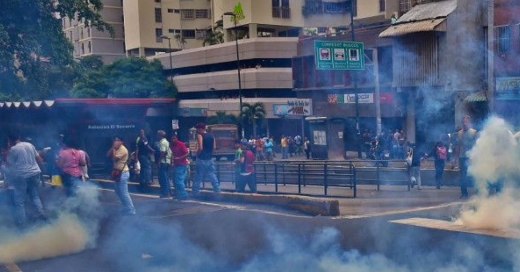
People line up somewhere in Venezuela to ratify their signatures
The Maduro Government, via the Electoral Board the CNE, has tried by all means to block the possibility of a recall referendum. These attempts have been abusive of the Rights of Venezuelans, as the Venezuelan Constitution establishes this as a basic political right of Venezuelans.
The CNE has pulled all of the stops, creating first unnecessary delays, to finally end up violating the rights of thousands of Venezuelans by voiding their signatures using excuses as lame as saying that the petition form did not have Maduro’s complete name (Shouldn’t it have been printed on it?). To make matters worse, people could withdraw their signature (about 5,000 people out of 2 million did it!), but could not revalidate their signature if the CNE had voided it. A somewhat biased principle if you ask me.
Additionally, the Electoral Board has made ridiculous interpretations of the laws, such as requiring 1% of all voters in each State, rather than 1% of all national voters, since the position is not a State position, but a national one.
Finally, since people have to go and ratify with their fingerprint that they signed the petition, the CNE assigned only 300 fingerprint machines NATIONWIDE, while everyone knows they own thousands of them (40,000 of them to be a lil more precise), distributing them in such a way as to make the process really difficult for everyone.
But as if this was not enough, yesterday, Electoral Board workers began a slow down process in the few states where it is very tight to gather the required 1%. The CNE seem to concentrate its effort by now in Nueva Esparta State, the State where Margarita Island is.
Here is a first hand account by long time reader Island Canuck in Nueva Esparta:
“Here’s our story of trying to confirm 3 signatures with my family.
After hearing horror stories about Juan Griego & La Asuncion we decided to try and go to El Maco which is almost in the exact middle of Isla Margarita. A very small pueblo where no one would expect a confirmation point.
We arrived at around 10 AM and registered with the MUD table that was there. We were given wrist bands with a number and asked to join the line.
It appeared fairly short so we were really surprised when someone indicated the the line went around the corner of the next block.
After a check we discovered that there were hundreds of people ahead of us – maybe 400 / 500.
After waiting almost an hour the line had only moved maybe 20 mts.
We returned to the check-in counter to ask how many people an hour they were processing. The lady shrugged and said that ideally 60 persons per hour. There was only 1 finger print machine. She admitted that the number was much less.
We decided that waiting further was a waste of time as we would never be processed and left with the idea to return another day much earlier. Even this idea is without much merit as they can’t possibly process the number of people that show up under current conditions.
This is definitely a planned exercise by the CNE to prevent at least 1 state from getting their 1%. That’s all they need to destroy the whole process.
As of 1.30 it was announced that the El Maco site had only processed 120 voters in 4½ hours – approx. 27 per hour.
They are going to do everything in their power to block at least 1 state. Then for sure the revocatorio will not occur in 2016.
I’m depressed as the MUD has no power to change anything.”
The only number that matters here is 27 voters processed per hour. This is absolutely ridiculous as the process takes no more than 15 seconds and in a regular election a single machine processes up to 2 and 3 thousand voters in eight hours.
But fascism acts like this, while assholes like Zapatero defend them as poor souls who have not adjusted to having lost the December election.
The four ladies in the Board of CNE should be prosecuted for this one day.Thousands of Venezuelans have had their rights violated in order to preserve a fascist Government which can not even provide the basic needs of the people.
I do hope that someone points this out today at the OAS meeting on whether to invoke or not the Democratic Charter on Venezuela. It may make no difference, but it will show the true nature of these for-rent left wing former Presidents, whose principles can be bought with a few meals, some nice hotels and the chance to believe that you may be once again important.


